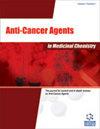Cordyceps militaris: A Comprehensive Study on Laboratory Cultivation and Anticancer Potential in Dalton's Ascites Lymphoma Tumor Model
IF 2.6
4区 医学
Q3 CHEMISTRY, MEDICINAL
Anti-cancer agents in medicinal chemistry
Pub Date : 2024-02-02
DOI:10.2174/0118715206282174240115082518
引用次数: 0
Abstract
Background: Cancer, a predominant cause of mortality, poses a formidable challenge in our pursuit of elevating life expectancy. Throughout history, individuals have sought natural remedies with minimal side effects as an appealing substitute for chemotherapeutic drugs. One such remedy is Cordyceps militaris, a renowned medicinal mushroom deeply entrenched in Asian ethnomedicine. Revered for its rejuvenating and curative attributes, it relied upon for ages. Objective: The mushroom’s soaring demand outpaced natural availability, necessitating controlled laboratory cultivation as the core focus and exploring the potential of methanolic extracts from harvested Cordyceps militaris fruiting bodies against Dalton's Lymphoma Ascites (DLA) cells in vitro, with a specific emphasis on its anticancer traits. Methods: For cultivation, we employed a diverse range of rice substrates, among which bora rice showed promising growth of C. militaris fruiting bodies. To assess DLA cell cytotoxicity, several assays, including trypan blue exclusion assay, MTT assay, and LDH assay, were employed at different time points (24-96 h), which provided valuable insights on DLA cell viability and proliferation, shedding light on its therapeutic potential against cancer. Results: Our studies unveiled that methanolic extract prompts apoptosis in DLA cells via AO/EB dual staining, manifesting consistent apoptosis indicators such as membrane blebbing, chromatin condensation, nuclei fragmentation, and cellular shrinkage at 48-96 h of treatment. Furthermore, these striking repercussions of apoptosis were comprehended by an in silico approach having molecular docking simulation against antiapoptotic proteins like BCL-2, BCL-XL, MCL-1, BFL-1 & HSP100. Conclusion: Methanolic C. militaris extracts exhibited cytotoxicity and apoptotic alterations in DLA cells冬虫夏草:实验室培养和道尔顿腹水淋巴瘤模型抗癌潜力的综合研究
背景:癌症是导致死亡的主要原因之一,对我们提高预期寿命提出了严峻的挑战。纵观历史,人们一直在寻找副作用最小的天然疗法来替代化疗药物。冬虫夏草就是这样一种疗法,它是一种在亚洲民族医学中根深蒂固的著名药用蘑菇。冬虫夏草具有返老还童和治疗疾病的功效,历来受到人们的推崇。目标:这种蘑菇的需求量急剧上升,超过了自然供应量,因此有必要将受控实验室栽培作为核心重点,并在体外探索从收获的冬虫夏草子实体中提取甲醇提取物对抗道尔顿淋巴瘤腹水(DLA)细胞的潜力,特别强调其抗癌特性。方法:在培养过程中,我们采用了多种水稻基质,其中波拉水稻对米氏蘑菇子实体的生长具有良好的促进作用。为了评估 DLA 细胞的细胞毒性,我们在不同的时间点(24-96 小时)采用了几种检测方法,包括胰蓝排除法、MTT 法和 LDH 法。研究结果我们的研究揭示了甲醇提取物通过 AO/EB 双重染色促使 DLA 细胞凋亡,在处理 48-96 h 时表现出一致的凋亡指标,如膜出血、染色质凝结、细胞核破碎和细胞萎缩。此外,这些令人震惊的细胞凋亡反响是通过针对抗凋亡蛋白(如 BCL-2、BCL-XL、MCL-1、BFL-1 & HSP100)进行分子对接模拟的硅学方法来理解的。结论甲醇 C. militaris 提取物在 DLA 细胞中表现出细胞毒性和凋亡改变
本文章由计算机程序翻译,如有差异,请以英文原文为准。
求助全文
约1分钟内获得全文
求助全文
来源期刊

Anti-cancer agents in medicinal chemistry
ONCOLOGY-CHEMISTRY, MEDICINAL
CiteScore
5.10
自引率
3.60%
发文量
323
审稿时长
4-8 weeks
期刊介绍:
Formerly: Current Medicinal Chemistry - Anti-Cancer Agents.
Anti-Cancer Agents in Medicinal Chemistry aims to cover all the latest and outstanding developments in medicinal chemistry and rational drug design for the discovery of anti-cancer agents.
Each issue contains a series of timely in-depth reviews and guest edited issues written by leaders in the field covering a range of current topics in cancer medicinal chemistry. The journal only considers high quality research papers for publication.
Anti-Cancer Agents in Medicinal Chemistry is an essential journal for every medicinal chemist who wishes to be kept informed and up-to-date with the latest and most important developments in cancer drug discovery.
 求助内容:
求助内容: 应助结果提醒方式:
应助结果提醒方式:


